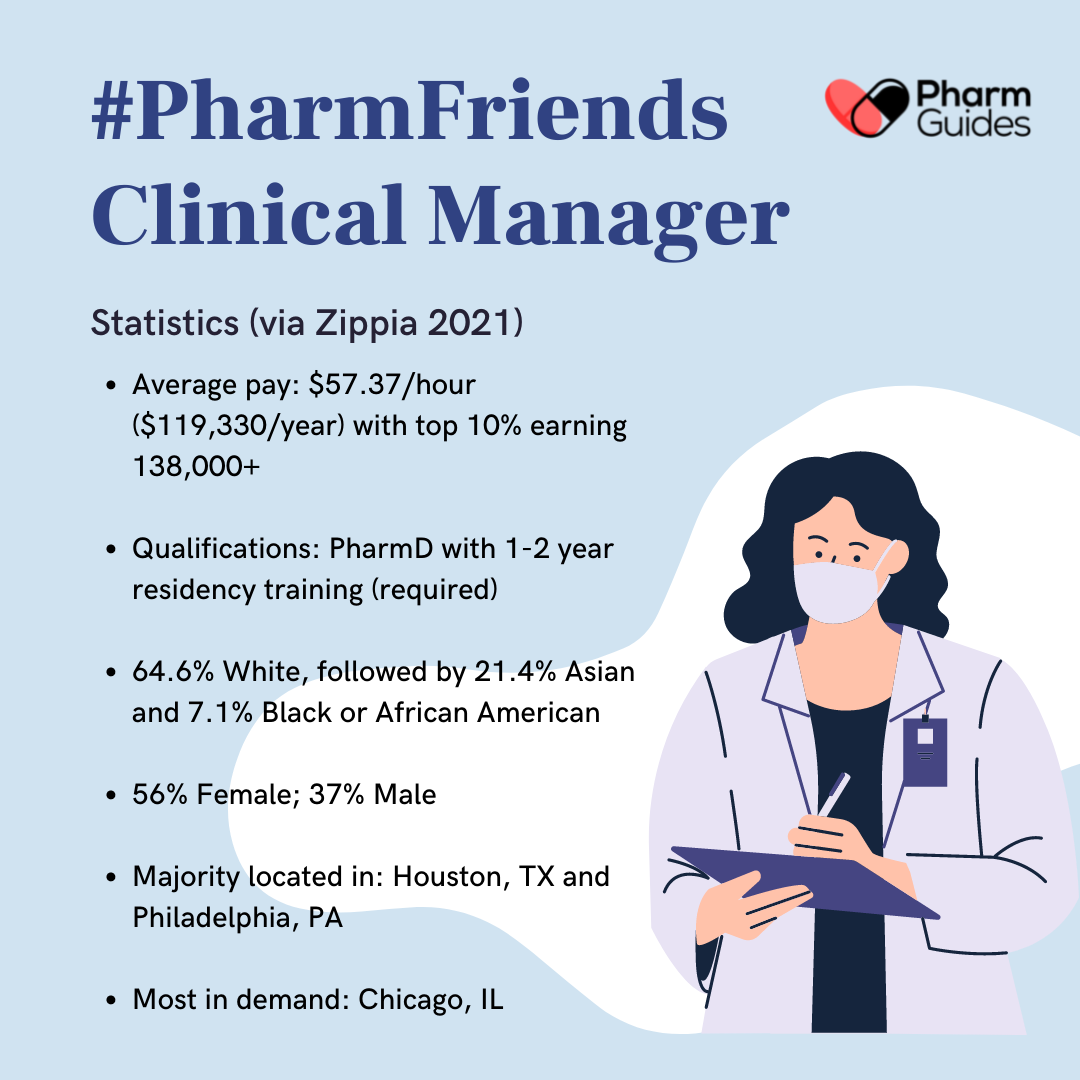What is a pharmacist clinical manager?
A pharmacist clinical manager works with other health care professionals to achieve best patient outcomes in the hospital. Pharmacist clinical managers directly influence many areas of the healthcare business, including: patient safety, research, education, administration, business management, leadership, and more. A clinical manager develops and implements policies, procedures, process guidelines, and protocols that directly change workflows in the hospital to improve efficiency and patient safety.
A clinical manager supervises clinical pharmacy staff, collaborates with physicians in establishing drug criteria for safe use of medications, manages non-formulary requests for drugs in the Pharmacy & Therapeutics Committee meetings, answers drug information questions, and more. There are varying types of clinical managers ranging from ambulatory care, infectious diseases, critical care, etc.
Statistics:
- Average pay: $57.37/hour ($119,330/year) with top 10% earning 138,000+
- Qualifications: PharmD with 1-2 year residency training (required)
- 64.6% White, followed by 21.4% Asian and 7.1% Black or African American
- 56% Female; 37% Male
- Majority located in: Houston, TX and Philadelphia, PA
- Most in demand: Chicago, IL
Where do Clinical Pharmacists Earn the Most? (via Zippia)
Source: Zippia.com 
Now lets get to the interview!
CL the Clinical Manager
How did you get this job? Was there networking in getting this position or did you point-blank apply on a listing?
I got hired internally. The position opened up during my residency and I applied.
Tell me a bit about your job.
My position has a lot of components that overlap. I’m a pediatric clinical pharmacist but I also handle investigational drug research as well as management responsibilities.
What is a typical day like for you?
As part of the pediatric team, I round two days a week with the peds team on PICU, NICU, and pediatric floors. I’m always available for any drug questions and orders that they have (regardless if I round). These include drug therapy recommendations, drug information, troubleshooting orders for the rounding team, and more.
For investigational drug research, I work with onsite physicians at Columbia University Medical Center and the pediatric infectious disease team reviewing studies and performing research trials of medications that are being tested inpatient. It’s basically all the clinical trial studies we read about in school, very paperwork intensive.
For operational work, I program all the knowledge based medications into our EMR system, send reports to staff, assist with scheduling and callouts, etc. I was a resident at this hospital so it helped with knowing the hospital workflow coming in.
What do you like about your job? And not like?
I enjoy being able to round with the pediatric team. Taking care of each patient as a team makes me feel useful while learning on the job. Since I didn’t do a PGY2, I’m learning something new every day and since it’s with a team it makes it easier to adapt to. For the investigational work organizing clinical trials, I didn’t even know it was an option while I was in pharmacy school. I don’t like the paperwork aspect but I enjoyed the process of an organized workflow in a clinical study. In regards to being a manager, the hours are great (9-5) but you have to be available even when you go home. One of the harder aspects is to be able to staff people.
Do you think a residency is required?
Yes. Working specifically here and getting a job afterwards, having a PGY1 makes the transition easier.
How clinical vs administrative is your job in terms of %?
Clinical 50%, Administration 50%
You just passed your BCPS last month – Congratulations! How long did you study for it and what resource did you use?
I didn’t really study that much to be honest. I studied after work for like 2-3 hours a day for a few weeks. I focused on my weakest topics and by the grace of God I was able to pass because it happened during the Joint Commission visit. If you have a strong foundational knowledge and worked in the hospital, you’re off to a good start.
I studied using the BCPS packet readings (ACCP Updates and Therapeutics).
Diana’s side comment: Note that CL has always been a great test taker throughout pharmacy school. I would be in the library every night and she would choose to sleep and still get a higher grade than me! Know yourself and don’t underestimate the exam from other people’s experiences!
What advice would you have for pharmacy students who are interested in this career path?
If you’re planning to climb the hospital pharmacy ladder, this is the job for you. This job is where you can build your clinical knowledge and administration experience. You can take these skills to work in different areas and continue on to director or move to industry.
In this day and age, I’d recommend completing a residency to keep your options open because of the competitive job market. Depending on the location of the job, some hospitals might not have the residency requirement but there is currently a saturation of qualified pharmacists. If you move somewhere without connections, it may be harder to get a job including staff positions with a residency.
